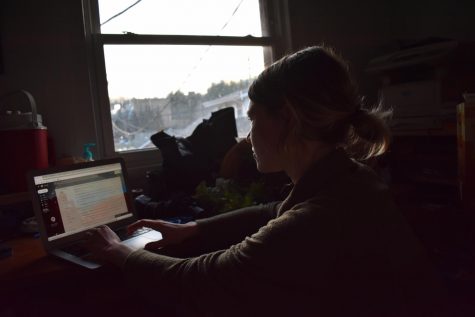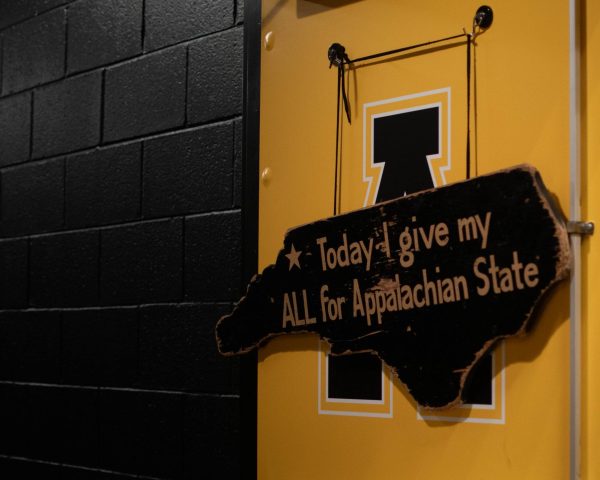Climate Action Collaborative creates petition, hopes to work with university on climate neutrality
March 4, 2020
After receiving a routine “Inside Appalachian” email from Chancellor Sheri Everts like all App State students, Caitlyn Daas decided to respond.
Daas wrote back, “Hello Chancellor Everts, hope you are well. Just wondering when you were planning on responding to the Climate Action Collaborative demands that we have called your office about.”
Daas was met with a reply from Chief Sustainability Officer Lee Ball rather than the chancellor.
Ball is on the Chancellor’s Cabinet and provides perspective on sustainability for the university. He has met with members of Climate Action Collaborative about items on the petition according to Megan Hayes, vice chancellor and chief communications officer.
Climate Action Collaborative is requesting a response from Everts to a petition the organization made for “commitment to climate action at App State.”
The petition references both the Student Government Association and Faculty Senate’s Climate Neutrality Bill, as well as the Office of Sustainability’s most recent Climate Action Plan.
The SGA bill proposes to achieve climate neutrality by 2025 and Faculty Senate’s by 2035.
Both passed in 2019 with support from Climate Action Collaborative. CAC is a grassroots movement of students, community members, faculty and staff working to facilitate climate action in the surrounding areas.
App State is bound to the UNC System policy of sustainability commitment to climate neutrality by 2050, but Daas said CAC feels that is too far away.
Everts spoke briefly about the Climate Action Planning Public Forum in “Inside Appalachian” emails last February. The forum invited members of the App State community to voice their opinions on the forthcoming climate action plan.

The Climate Action Collaborative eagerly awaits a response from Chancellor Sheri Everts on the university’s progress toward climate neutrality. This is following a petition by the organization, as well as the passing of the “Climate Neutrality Bill” in 2019.
“Mountaineer resilience and determination sustain us as we prepare our students to live purposeful lives,” the chancellor wrote.
Daas said CAC is thankful the chancellor supports the updated climate action plan, which will be released on the 50th Earth Day, April 22. The collaborative also understands the position that the chancellor is in as a member of the UNC System.
“This could threaten her position as chancellor,” Daas said. “We don’t want Chancellor Everts to be fired because the likelihood that she would be replaced by someone who cares more about sustainability is pretty slim, especially if the board of governors has anything to do with it.”
Daas said a response would help begin a relationship between administration and CAC. She wants to know how the two can work with each other toward climate neutrality with both the community and her position in mind.
Without this response, Daas said CAC doesn’t know how far it can go with its push for climate neutrality. This same feeling of uncertainty inspired the petition.
Michael Weiss, a junior sustainable development major, helped write the petition and is a member of CAC.
Weiss said the collaborative feels it has reached all possible channels for change through SGA and Faculty Senate. Weiss feels that there isn’t much more the collaborative can do until the chancellor responds.
“It is about climate change and getting these important things done, but in a huge way it’s about asking, ‘What do the people of the university want and why isn’t the administration listening?” Weiss said.
Eric Halvarson, an App State graduate and one of the petition writers, said while a response from the chancellor is important, so is making climate action mandatory and enforceable.
“In the past, we’ve had climate action plans that have largely been untouched. The Office of Sustainability, or whoever is supposed to enforce the plan, has not been able to have the power or the authority to make sure it gets done,” Halvarson said.
The petition reads, “If the chancellor continues to refuse to make a bold and inspiring commitment to establishing App State as a leader in climate action, we will have no choice but to interpret her inaction as disregard for the principles of shared governance, the future well-being of our students, and the stated mission of the university which includes equipping students to create healthy, just, and sustainable societies.”
CAC feels stuck without a response and is likely to take further action if one is not received. CAC feels that the likelihood of a response is slim.












